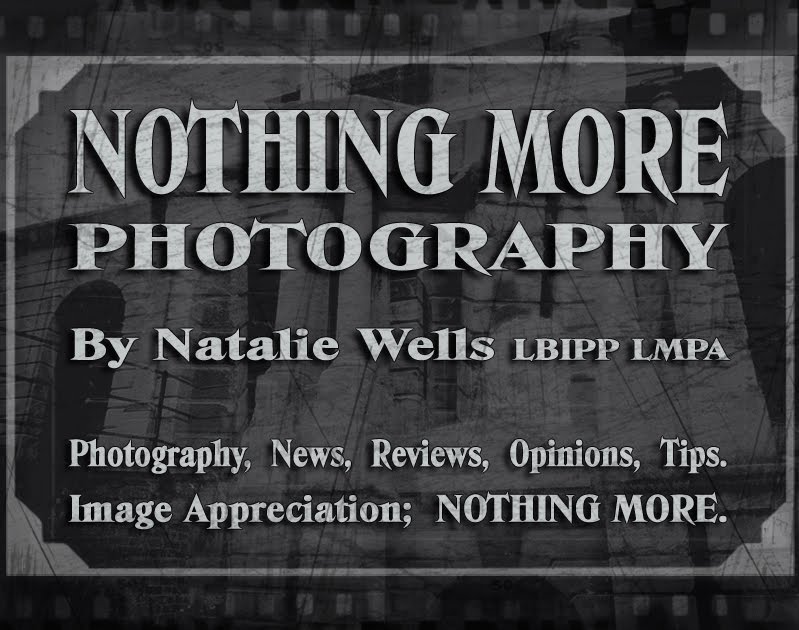I was recently interviewed by the marvellous Tina for her blog, Zachary Quinto's Biceps.
This is my first interview, so if you are at all interested in the goings-on behind Nothing More then I urge you to check it out. Here is Part One, Part Two will be up in a few days.
Focus: Nothing More (Part 1)
I am flying off to Japan in a few hours and will endeavour to keep this as up to date as I can, while also posting Daily Photos via Twitter and Facebook. For the most part I imagine they will be good fun shots with something nice and arty thrown in every so often to keep the balance. Hope to keep you entertained!
About The Photographer

- Nothing More
- London
- Natalie Wells is a London based photographer who specialises in avant-garde portraiture.
She has been awarded membership to The British Institute of Professional Photography and The Master Photographers Association. Using her large collection of both digital and analogue cameras, Natalie enjoys shooting a vast array of subjects.
Tuesday 14 September 2010
Sunday 5 September 2010
The Beginning
Photographs; they really are everywhere. Photos we take, photos we like, even photos on crisp packets. Look around your immediate area, how many can you see? I just counted 27, right in front of me. Now granted, I surround myself with images and I have a very messy desk, but I imagine this figure is not far off the average.
We can be forgiven for taking photos for granted. They encompass us to a point where we do not even notice what was created specifically to be seen. Incredible; when I think of how far the photograph has come in such a short space of time, it never fails to delight and astound me.
In 1826, just 184 years ago, a process to fix or ‘save’ a photograph was created. Since then processes were experimented with, perfected and before long, our photos were moving, then sound was added… but that leads us down a different path.
It is hard to imagine life without the photographic image; the earliest photographers changed the world for us. Photographers had no ‘category’ to neatly fit into; they were not considered artists or scientists. In the Victorian world, when innovation and industry were booming, the earliest photographers had no place. To some, this meant both the photographers and their passions were to be feared. I have always felt that these early pioneers were incredibly brave. They were people who had money, who had social standing and yet they were prepared to risk it all for their art and their belief in this new medium.
I can only imagine the heartache of being an artist, of considering yourself an artist, with an incredible new medium, only to have both it and yourself shunned by the artistic community. It is a world so very different from our own.
With each new generation discovering photography, its roots must seem further and further away. What could a 15 year old girl with a Canon 5D Mk II possibly have in common with Julia Margaret Cameron? Well, in fact, she has quite a lot. One would hope a child with that kind of camera would want to explore various methods of creating images, discovering her own style. She sees the world with fresh photographic eyes, inspired, not jaded; she is full of potential. This, I imagine, is how Julia Margaret Cameron must have felt in 1864, on her 48th birthday. Cameron’s love for her craft is apparent in every single one of her beautiful images. These photographs, forged with glass plates and chemicals, have stood the test of time. As a source of inspiration and learning, they are still incredibly relevant. It is worth remembering that photographers, no matter what the age, genre or era, are cut from the same cloth. We are artists, but still a breed apart.
Perhaps it is too romantic an idea to hope that everyone who considers themselves a photographer, appreciates where their art-form originally came from and the hardships that were involved. It only takes a few though, just a few people to take a moment, have a think, maybe go to an exhibit, or buy a book or even just Google one of these pioneer photographers. To take a few minutes to look at the work, look at the understanding of light and think, “My god, no Photoshop!”. In those moments, the photographer, the viewer and the photograph come alive with as much purpose as they had on the day the image was shot; to inspire.
If this article has inspired you, please take a look at the work of some of my favourite photographers who were working before 1900.
----------
----------
----------
----------
----------
----------
----------
----------
Wednesday 1 September 2010
Subscribe to:
Posts (Atom)









